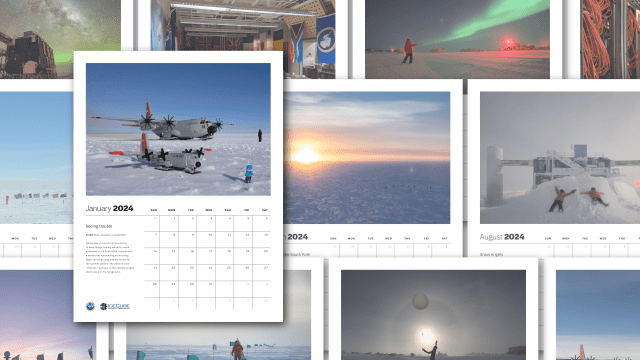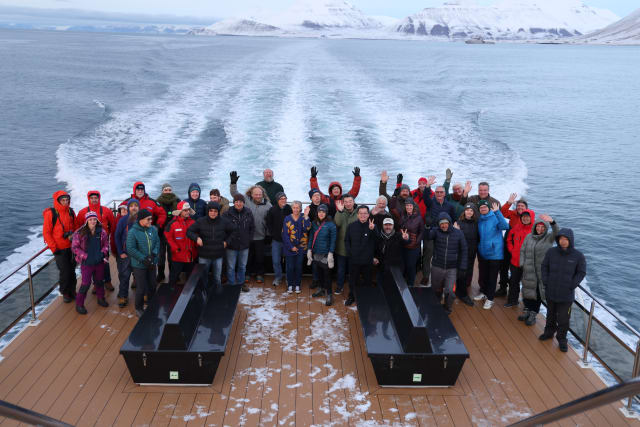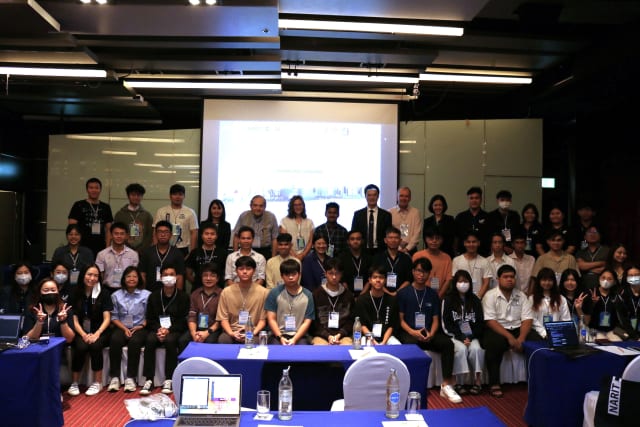- Twelfth edition of IceCube Masterclass brings together students and scientists
 by Alisa King-KlempererOver 200 students across 18 institutions in Belgium, Canada, Germany, India, and the United States participated in the twelfth annual edition of IceCube Masterclass. The masterclasses were held between the months of March and May, with the Institute of Physics (IOP) in India and the University of Nevada, Las Vegas, hosting masterclasses for the first time. Since 2014, the program has exposed high school students—mostly sophomore level and up—to research careers in astrophysics and IceCube science. Each host institution provides a day full of hands-on activities and lectures, including analysis of real IceCube data, lunch with IceCube researchers, and a […]
by Alisa King-KlempererOver 200 students across 18 institutions in Belgium, Canada, Germany, India, and the United States participated in the twelfth annual edition of IceCube Masterclass. The masterclasses were held between the months of March and May, with the Institute of Physics (IOP) in India and the University of Nevada, Las Vegas, hosting masterclasses for the first time. Since 2014, the program has exposed high school students—mostly sophomore level and up—to research careers in astrophysics and IceCube science. Each host institution provides a day full of hands-on activities and lectures, including analysis of real IceCube data, lunch with IceCube researchers, and a […] - IceCube’s hidden depths revealed in theatrical festival documentary “Messengers”
 by StaffThe IceCube Neutrino Observatory, a massive astroparticle physics experiment located at the South Pole, is the subject of the final chapter in a new documentary, “Messengers,” from Canadian director Jeffrey Zablotny. The film is a poetic, immersive exploration of three neutrino detectors: SNO+ in Canada, Super-Kamiokande in Japan, and IceCube at the South Pole. The film is premiering at Visions du Réel, a renowned international film festival presenting audacious and singular works that push the boundaries of documentary filmmaking. It screens April 9th and 10th in Nyon, Switzerland. The film will go on to screen at DOXA in Vancouver, Canada, […]
by StaffThe IceCube Neutrino Observatory, a massive astroparticle physics experiment located at the South Pole, is the subject of the final chapter in a new documentary, “Messengers,” from Canadian director Jeffrey Zablotny. The film is a poetic, immersive exploration of three neutrino detectors: SNO+ in Canada, Super-Kamiokande in Japan, and IceCube at the South Pole. The film is premiering at Visions du Réel, a renowned international film festival presenting audacious and singular works that push the boundaries of documentary filmmaking. It screens April 9th and 10th in Nyon, Switzerland. The film will go on to screen at DOXA in Vancouver, Canada, […] - Download IceCube’s 2025 calendar!
 by StaffIt’s almost the new year, which means it’s time for the 2025 IceCube Calendar! Featuring breathtaking photos taken by our winterovers from the past few years, this calendar will teach you something new about the IceCube Neutrino Observatory and the South Pole every month. The calendar is available to download in three different sizes in either full color or black-and-white. […]
by StaffIt’s almost the new year, which means it’s time for the 2025 IceCube Calendar! Featuring breathtaking photos taken by our winterovers from the past few years, this calendar will teach you something new about the IceCube Neutrino Observatory and the South Pole every month. The calendar is available to download in three different sizes in either full color or black-and-white. […] - WIPAC agreement with Thai partners signals enthusiasm for future collaborations
 by StaffThis story was originally published by the University of Wisconsin–Madison International Division. Among the University of Wisconsin–Madison’s many ambitious research endeavors, the IceCube Neutrino Observatory stands out as one of the most unique. This remarkable telescope, which has instrumented a billion tons of South Pole ice, is designed to search for tiny, ghostlike particles called neutrinos, helping scientists study the universe’s most powerful cosmic engines. When neutrinos interact with ice molecules, they produce tiny flashes of blue light, known as Cherenkov light, which IceCube detects. IceCube research is carried out by the IceCube Collaboration, an international group of more than 350 scientists […]
by StaffThis story was originally published by the University of Wisconsin–Madison International Division. Among the University of Wisconsin–Madison’s many ambitious research endeavors, the IceCube Neutrino Observatory stands out as one of the most unique. This remarkable telescope, which has instrumented a billion tons of South Pole ice, is designed to search for tiny, ghostlike particles called neutrinos, helping scientists study the universe’s most powerful cosmic engines. When neutrinos interact with ice molecules, they produce tiny flashes of blue light, known as Cherenkov light, which IceCube detects. IceCube research is carried out by the IceCube Collaboration, an international group of more than 350 scientists […] - Help IceCube (again!) decode signals from outer space
 by Alisa King-KlempererLast year, the “Name that Neutrino” project was launched, which called on volunteers from the public to help classify signals from neutrinos—tiny, ghostlike particles from outer space—for the IceCube Neutrino Observatory at the South Pole. The project was hosted on Zooniverse, the largest web-based research platform that invites novices and science enthusiasts alike to contribute to ongoing research through an online experience. After a successful first launch with 128,000 classifications of IceCube neutrino signals, the findings were reported in a study published in European Physical Journal Plus, in a focus issue on citizen science for physics. The study revealed some […]
by Alisa King-KlempererLast year, the “Name that Neutrino” project was launched, which called on volunteers from the public to help classify signals from neutrinos—tiny, ghostlike particles from outer space—for the IceCube Neutrino Observatory at the South Pole. The project was hosted on Zooniverse, the largest web-based research platform that invites novices and science enthusiasts alike to contribute to ongoing research through an online experience. After a successful first launch with 128,000 classifications of IceCube neutrino signals, the findings were reported in a study published in European Physical Journal Plus, in a focus issue on citizen science for physics. The study revealed some […] - Jim Madsen retires after 25 years with neutrinos
 by Alisa King-KlempererJim Madsen, interim director of the Wisconsin IceCube Particle Astrophysics Center (WIPAC) at the University of Wisconsin–Madison and associate director for education and outreach for the IceCube Neutrino Observatory, recently announced that he was retiring after 25 years with IceCube and its predecessor AMANDA. His last day in the office was August 2. “With a passion for education, outreach, and science, combined with his undeniable leadership skills, Jim transformed WIPAC from a concept into what it is today,” says Francis Halzen, UW–Madison physics professor and IceCube principal investigator. Madsen received his PhD in physics from the Colorado School of Mines […]
by Alisa King-KlempererJim Madsen, interim director of the Wisconsin IceCube Particle Astrophysics Center (WIPAC) at the University of Wisconsin–Madison and associate director for education and outreach for the IceCube Neutrino Observatory, recently announced that he was retiring after 25 years with IceCube and its predecessor AMANDA. His last day in the office was August 2. “With a passion for education, outreach, and science, combined with his undeniable leadership skills, Jim transformed WIPAC from a concept into what it is today,” says Francis Halzen, UW–Madison physics professor and IceCube principal investigator. Madsen received his PhD in physics from the Colorado School of Mines […] - IceCube Masterclass brings together students and scientists from around the world
 by Alisa King-KlempererThis year, over 200 students across 20 research institutions in Belgium, Canada, Denmark, Germany, Thailand, Sweden, and the United States participated in the eleventh edition of IceCube Masterclass. The masterclasses were held between the months of January and May, with many of them running an in-person program. This year, the University of Utah and Chiang Mai University in Thailand participated in masterclass for the first time. Since 2014, the program has exposed high school students—mostly sophomore level and up—to research careers in astrophysics and IceCube science. Each host institution provides a day full of hands-on activities and lectures, including analysis […]
by Alisa King-KlempererThis year, over 200 students across 20 research institutions in Belgium, Canada, Denmark, Germany, Thailand, Sweden, and the United States participated in the eleventh edition of IceCube Masterclass. The masterclasses were held between the months of January and May, with many of them running an in-person program. This year, the University of Utah and Chiang Mai University in Thailand participated in masterclass for the first time. Since 2014, the program has exposed high school students—mostly sophomore level and up—to research careers in astrophysics and IceCube science. Each host institution provides a day full of hands-on activities and lectures, including analysis […] - Thai engineer joins the IceCube Upgrade project
 by StaffThai engineer Chana Sinsabvarodom was recently selected to work on the IceCube Upgrade project, which will install seven more densely instrumented strings of light sensors near the center of the IceCube array at the South Pole. The IceCube Upgrade will significantly enhance IceCube’s sensitivity to lower-energy neutrinos, improve the fidelity of all past and future data, and test future technologies. Chiang Mai University in Thailand is an associate member of the IceCube Collaboration. Sinsabvarodom, a researcher and lecturer at Chiang Mai University, is the first Thai researcher to work at the South Pole for the IceCube project. He will begin […]
by StaffThai engineer Chana Sinsabvarodom was recently selected to work on the IceCube Upgrade project, which will install seven more densely instrumented strings of light sensors near the center of the IceCube array at the South Pole. The IceCube Upgrade will significantly enhance IceCube’s sensitivity to lower-energy neutrinos, improve the fidelity of all past and future data, and test future technologies. Chiang Mai University in Thailand is an associate member of the IceCube Collaboration. Sinsabvarodom, a researcher and lecturer at Chiang Mai University, is the first Thai researcher to work at the South Pole for the IceCube project. He will begin […] - Download IceCube’s 2024 calendar!
 by StaffIt’s almost the new year, which means it’s time for the 2024 IceCube Calendar! Featuring breathtaking photos taken by our winterovers from the past few years, this calendar will teach you something new about the IceCube Neutrino Observatory and the South Pole every month. The calendar is available to download in three different sizes in either full color or black-and-white. […]
by StaffIt’s almost the new year, which means it’s time for the 2024 IceCube Calendar! Featuring breathtaking photos taken by our winterovers from the past few years, this calendar will teach you something new about the IceCube Neutrino Observatory and the South Pole every month. The calendar is available to download in three different sizes in either full color or black-and-white. […] - IceCube back at holiday light display in Madison, WI
 by Alisa King-KlempererThe Wisconsin IceCube Particle Astrophysics Center (WIPAC) is back for another year at the Holiday Fantasy in Lights event in Madison, WI! WIPAC, a research center that is part of UW–Madison’s Office of the Vice Chancellor for Research and Graduate Education, participated in the annual holiday exhibit for the last three years. The lights will be on every night from dusk until dawn, November 11, 2023 – December 31, 2023, at Olin Park in Madison, WI. The drive-through event is free and open to the public! Our IceCube light display depicting the IceCube Neutrino Observatory is back again this year. […]
by Alisa King-KlempererThe Wisconsin IceCube Particle Astrophysics Center (WIPAC) is back for another year at the Holiday Fantasy in Lights event in Madison, WI! WIPAC, a research center that is part of UW–Madison’s Office of the Vice Chancellor for Research and Graduate Education, participated in the annual holiday exhibit for the last three years. The lights will be on every night from dusk until dawn, November 11, 2023 – December 31, 2023, at Olin Park in Madison, WI. The drive-through event is free and open to the public! Our IceCube light display depicting the IceCube Neutrino Observatory is back again this year. […] - SCAR AAA meets above the Arctic Circle for 7th workshop
 by StaffThe seventh meeting of the Scientific Committee on Antarctic Research Astronomy and Astrophysics from Antarctica (SCAR AAA) was held September 19-21, 2023, about 1400 km from the North Pole in the northernmost town in the world, Svalbard, Norway. The three-day workshop brought together dozens of researchers from nine countries to discuss, coordinate, and promote astronomical and astrophysical activities in Antarctica. […]
by StaffThe seventh meeting of the Scientific Committee on Antarctic Research Astronomy and Astrophysics from Antarctica (SCAR AAA) was held September 19-21, 2023, about 1400 km from the North Pole in the northernmost town in the world, Svalbard, Norway. The three-day workshop brought together dozens of researchers from nine countries to discuss, coordinate, and promote astronomical and astrophysical activities in Antarctica. […] - Second ThaisCube workshop strengthens partnership between IceCube, Thailand
 by Alisa King-KlempererLast week concluded the 2nd ThaisCube workshop held in Chiang Mai, Thailand, a program that developed from a partnership between Chiang Mai University (CMU) in Thailand, the National Astronomical Research Institute of Thailand (NARIT), and the IceCube Neutrino Observatory. The workshop brought together IceCube researchers, Thai scientists, and aspiring young students. Held on August 8-11, the workshop hosted 40 high school, undergraduate, and master’s students pursuing degrees in physics, astronomy, mathematics, computer science, engineering, or related fields. For the first time, the program welcomed students from Thailand, USA, and the Philippines. Participants were able to interact with and hear from […]
by Alisa King-KlempererLast week concluded the 2nd ThaisCube workshop held in Chiang Mai, Thailand, a program that developed from a partnership between Chiang Mai University (CMU) in Thailand, the National Astronomical Research Institute of Thailand (NARIT), and the IceCube Neutrino Observatory. The workshop brought together IceCube researchers, Thai scientists, and aspiring young students. Held on August 8-11, the workshop hosted 40 high school, undergraduate, and master’s students pursuing degrees in physics, astronomy, mathematics, computer science, engineering, or related fields. For the first time, the program welcomed students from Thailand, USA, and the Philippines. Participants were able to interact with and hear from […]